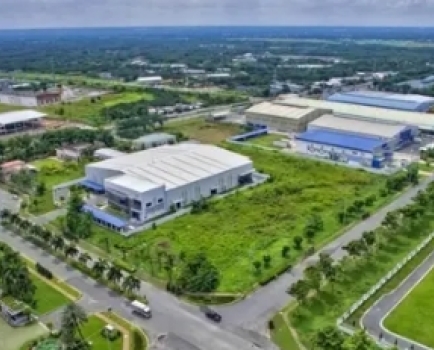Human Resources for Sustainable Digital Economy
Wed, 01 Dec 2021 10:10:00 | Print | Email Share:
The digital economy, driven by the Fourth Industrial Revolution or Industry 4.0, has made transformational changes in production methods of enterprises, facilitated by digital technology. These entail changes in input production factors, with the biggest change being the labor force. However, human resources for the digital economy are not yet ready.
Mr. Pham Tan Cong, President of VCCI, said, the inclusive digital economy enables all workers and businesses to contribute to growth and enjoy fruits of such growth. This approach is completely consistent with the sustainable development goals set by the Vietnamese government, most recently the National Action Plan to achieve the 2030 Agenda for Sustainable Development in response to the United Nations Sustainable Development Goals (SDGs).

Industry 4.0 - Learnt but not applied
Dr. Luong Minh Huan, Director of the Enterprise Development Institute - VCCI, said, a survey into more than 450 enterprises of various sizes and industries conducted by VCCI in 2021 showed that there is a rather long distance from thought to action of enterprises in Industry 4.0 application. Up to 80% of businesses know about specific skills but only 20% apply. They are generally slow to prepare their personnel for Industry 4.0, with 42% having no preparation, while only 6% have training plans for Industry 4.0. While soft skills are considered to play an important role in the Industry 4.0 skills framework and professional workers for Industry 4.0 are short.
On the capacity-building picture, 80% are currently actively training their employees, mainly upskilling (65.1%), skilling training (57.6%), reskilling (46.1%) and specialized skills for Industry 4.0 (17.6%). This is quite logical given the limited participation of Vietnamese enterprises in global supply chains and digital transformation.
On participation of civil society organizations, in-depth consultation with 20 leading organizations in this field revealed their untapped potential in filling the gap in capacity building for Industry 4.0 that helps optimize social resources. Specifically, for workers in informal sectors, free sectors and disadvantaged groups, civil society organizations are accessing and providing content and topics that other service providers are not interested in, such as specific skills that help workers protect their rights in Industry 4.0. Because there are no appropriate promotion mechanisms and policies, potential contribution and strengths of civil society organizations have not been brought into full play.
Notably, according to the Ministry of Labor, Invalids and Social Affairs, Industry 4.0 is creating a double disruption to the labor market and labor structure due to high requirements for new skills. It is forecasted that about a half of machines will replace humans in production, business and administrative processes in the next 5-10 years, causing about 1 billion workers globally to lack working skills due to their failure to keep up with technological trends.
Focus on human resources training
According to Mr. Ngo Duy Hieu, Vice President of the Vietnam General Confederation of Labor, the Covid-19 pandemic has instigated unprecedented difficulties for the majority of workers and the business community, combined with other enormous challenges caused by Industry 4.0, placing extremely difficult and unprecedented demand on each employee now and in the future. “Only by quickly changing mindsets, catching up with knowledge, improving self-efficacy, and getting the fastest approach to the breath of reality can workers be firm at work, active in life and "not left behind,” he said.
According to research conducted by VCCI, simple work will gradually be replaced by machines and robots while adaptive workers will need upskilling suitable for Industry 4.0 manufacturing. Therefore, one of the requirements for countries is to have a skilling and reskilling strategy for workers.
To implement this strategy, in addition to the role played by authorities and vocational education schools, the role of enterprises will become increasingly important. Their engagement in the capacity of employers in training not only helps reduce burdens on the government in terms of infrastructure investment but also helps direct and train workers with suitable skills needed by the market, especially in the course of transition to Industry 4.0 manufacturing.
Particularly, according to VCCI, the policy believed to positively change corporate participation in skills training and capacity building for employees in the time of Industry 4.0 is building a standard framework for suitable skills for Industry 4.0 and designing and renovating skills training programs integrated with what is needed by Industry 4.0. Moreover, businesses also expect the government to invest in high-quality vocational training schools, key industries and occupations and revise policies to give more autonomy to training schools.
In addition, the solution that training institutions need to do most is to improve training capacity, link labor training with market demand towards Industry 4.0 to ensure that trainees meet employment requirements.
For their part, businesses necessarily develop strategies and allocate resources for labor training, actively coordinate with training institutions to update new professional standards and new technologies, especially in the context of Industry 4.0. Business leaders need to change their perception of benefits derived from training cooperation with schools, provide skills requirements for schools to determine training output standards, achieve the right training results and limit reskilling training.
Last but not least, there is a need to foster the participation of intermediary organizations, an important link in this process. The research by VCCI showed that many businesses hope that intermediaries which represent businesses, civil society organizations and international organizations will have more seminars and training sessions on opportunities and challenges in the context of Industry 4.0, support businesses and schools to improve training capacity for employees, especially social skills, update new skills models and frameworks adopted by international organizations.
By: Quynh Chi, Vietnam Business Forum
Source: https://vccinews.com/news/46129/human-resources-for-sustainable-digital-economy.html
---------------------------------------------
Same category News :













